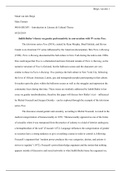Berge, van den 1
Maud van den Berge
Marc Farrant
900161HUMY – Introduction to Literary & Cultural Theory
05/28/2019
Judith Bulter’s theory on gender performativity in conversation with TV series Pose.
The television series Pose (2018), created by Ryan Murphy, Brad Falchuk, and Steven
Canals is an American TV series influenced by the American documentary film Paris is Burning
(1990). Paris is Burning documented the ball culture in New York during the mid-to-late 1980s.
One could argue that Pose is a dramatized and more fictional remake of Paris is Burning, as the
narrative structure of Pose is fictional, but the ballroom scenes and the characters are very
similar to those in Paris is Burning. Pose portrays the ball culture in New York City, following
the lives of African American, Latino, gay and transgender peoples participating in that culture.
It touches upon the glory within the ballroom scenes as well as the struggles and oppression the
community faces during that time. These issues are similarly addressed by Judith Butler in her
essay on gender insubordination, therefore this paper will discuss how Butler’s text – influenced
by Michel Foucault and Jacques Derrida – can be explored through the example of the television
series Pose.
The discourse around gender and sexuality, according to Michel Foucault, is rooted in the
medical categorization of homosexuality in 1870. “Homosexuality appeared as one of the forms
of sexuality when it was transposed from the practice of sodomy to a kind of interior androgyny,
a hermaphrodism of the soul” (Foucault 1472). Language influences the categorization of gender
as societies have a strong tendency to give everything a name in order to control it, following
Foucault’s argument that “modern power produces the very categories, desires, and actions it
strives to regulate” (1472). Foucault’s power/knowledge argument and the notion that nothing
appears outside of discursive and social networks is what Judith Butler bases her argument on,
, Berge, van den 2
saying that to be able to identify with something one has to disregard another thing, which,
according to Butler, “[discloses] the true and full of that “I”, a certain radical concealment is
thereby produced” (309). To be able to identify oneself, distinction from others within societal
structures is necessary, therefore one can never step outside of the societal structures that exist
around, for instance, gender. In other words, when identifying as e.g. a lesbian, one conforms to
the totalization of that ‘being’ within the boundaries of it.
However, the deconstructionist approach attempts to identify what encompasses these
societal structures to be able to deconstruct them and question the assumptions about what
individuals are. Foucault’s argument is that “the homosexual carries his homosexuality within
himself at every moment; the act comes to determine identity”, and through this “modern power
produces subjects who have identities” (1473). Butler has a similar argument saying that by
distinguishing oneself as other than heterosexual, i.e. being ‘out’, “always depends to some
extent on being “in”; it gains its meaning only within that polarity” (309). The deconstructionist
approach tries to dismantle this in saying that there is no core gender identity from which we
derive all ‘other’ identities. Furthermore, this is where Butler argues that gender is performative
in the way that one can “both “be” one, and yet endeavor to be one at the same time” (311). She
stresses that gender performativity is not like playing a role but “how and where [playing] at
being [a lesbian] is the way in which that “being” gets established, instituted, circulated, and
confirmed” (311).
Relating this to how drag culture is represented in Pose, the performative part of gender
can be taken more literally as an object of analysis. Butler claims that “the professionalization of
gayness requires a certain performance and production of a “self” which is the constituted effect
of a discourse that nevertheless claims to “represent” that self as a prior truth” (310). This is
visible in Pose through the focus on how the characters in the show struggle to be authentic and
express their own style as transgender women. The way in which the trans women in Pose are





